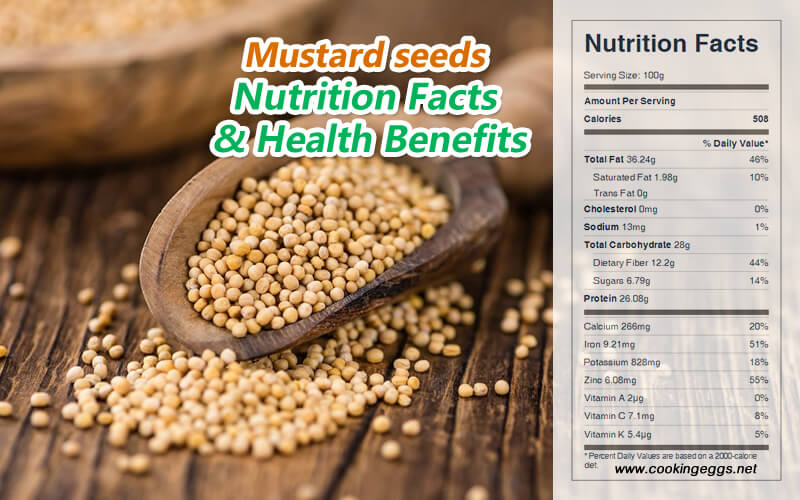Mustard Seeds Nutrition Facts & Health Benefits
Mustard seeds come from the mustard plant, which is a cruciferous vegetable. Mustard is typically consumed as a condiment. Consuming the seeds or cooking with them adds to the potential antioxidant, antiinflammatory, and anticancer benefits you can gain from these super seeds!
In general, three main varieties of mustard are grown worldwide for use:
• White mustard seeds: The seeds are light straw yellow-colored and are slightly larger than the other two varieties. White seeds exhibit mild pungency.
• Black mustard seeds: The seeds are commonly seen in South Asia. The seeds are sharp and more pungent than other two varieties.
• Brown mustard seeds: The seeds are native to sub-Himalayan plains ofnorthern India.
Nutritional Value of Mustard seeds
Mustard seeds contain a variety of minerals, including iron, magnesium, zinc, calcium, and phosphorus. Getting adequate amounts of these minerals is essential for the normal function of many biological and biochemical processes within your body and can help prevent a mineral deficiency, which can have potentially debilitating side effects.
In a 100-gram reference amount, mustard seeds supply 508 calories of food energy and are a rich source of vitamin E (34% of the Daily Value), magnesium (104% of the DV), iron (71% of the DV), zinc (64% of the DV), calcium (27% of the DV), and high in vitamin B complex.

Mustard seeds Nutrition Facts Label
Health Benefits of Mustard seeds
Like other brassicas, mustard seeds contain plentiful amounts of phytonutrients called glucosinolates. The seeds also contain myrosinase enzymes that can break apart the glucosinolates into other phytonutrients called isothiocyanates. The isothiocyanates in mustard seed (and other brassicas) have been repeatedly studied for their anticancer effects. In animal studies—and particularly in studies involving the gastrointestinal tract and colorectal cancer—intake of isothiocyanates has been shown to inhibit the growth of existing cancer cells and to be protective against the formation of such cells.
Glucosinolates are sugar-derived compounds that are found naturally in many flowering plants. The glucosinolates found in plants may have a protective effect against certain types of cancer, especially lung cancer. The mustard seed, similar to turnips, contains the enzyme myrosinase, which breaks down the glucosinolates into isothiocyanates. This phytonutrient has frequently been studied for its anticancer properties. It has also been studied for its effect on stomach and colorectal cancers. Studies have demonstrated that isothiocyanates inhibit the growth of cancer cells and protect against new cell development.
Mustard seeds are an excellent source of essential vitamin B compounds such as folate, niacin, thiamin, riboflavin, pyridoxine (vitamin B 6 ), and pantothenic acid. The body requires these vitamins in the sense that it requires them from external sources to replenish. These B complex groups of vitamins help in enzyme synthesis, nervous system function, and regulating body metabolism.
Mustard seeds are an excellent source of selenium, a nutrient that has been shown to help reduce the severity of asthma, decrease some of the symptoms of rheumatoid arthritis, and help prevent cancer.
They also qualify as a good source of magnesium. Like selenium, magnesium has been shown to help reduce the severity of asthma, lower high blood pressure, restore normal sleep patterns in women having difficulty with the symptoms of menopause, reduce the frequency of migraine attacks, and prevent heart attacks in patients suffering from atherosclerosis or diabetic heart disease.
Mustard seeds are a good source of iron. Iron is essential for red blood cells, where most of the human body's iron is contained. Controlling iron levels in the body is a critically important part of many aspects of human health and disease.
The seeds are a source of vitamin E and gamma-tocopherol and contain about 19.82 mg per 100 g. Vitamin E is a powerful lipid-soluble antioxidant, required for maintaining the integrity of the cell membrane of mucous membranes and skin by protecting it from harmful oxygen-free radicals.